by [email protected] | Nov 17, 2021 | Prescriptions for your Practice
Podcast: Play in new window | Download
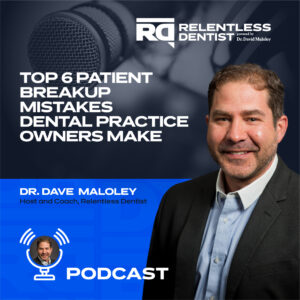 Before you tap that play button, I want you to ponder these questions first: What do patients consider when they choose their dentist? And what makes them go and explore dental services from other dentists?
Before you tap that play button, I want you to ponder these questions first: What do patients consider when they choose their dentist? And what makes them go and explore dental services from other dentists?
In medicine, research shows that 30% of patients leave the doctor’s office because of long wait times. Unfortunately, the number is higher when it comes to dental offices. The long wait times can make a patient believe that you’re in a poorly run business. And if it’s a poorly run business, you have subpar clinical standards.
In today’s episode, I will discuss the six top reasons why patients break up with dentists. Then, we will talk about patients’ perception of us and how we can maintain that in a positive frame, and how we can prevent the consequences of patient attrition. I’ll also share lessons from medical doctors’ mistakes so that you can prevent patients from even wondering if the grass is greener somewhere else. So just sit back, relax and enjoy the show.
Tune in and find solutions to common practice issues at Prescriptions for Your Practice.
Key Quotes:
- “As smart business owners, we have to manage the upside push for growth and minimize the downside. And what’s the downside when it comes to enthusing clients? I think that’s when patients leave the practice, when they break up with us, and when there’s patient attrition.”
- “Oftentimes, we’re able to maintain the relationship with the patient once they feel understood. And even if we weren’t, we can learn things that will help our processes, our systems. So as we strove to get better and better, we looked for more gems in those situations.”
- “Now urgent care is a big patient perception because what is no big deal to you might be a really big deal to patients.”
- “Patients aren’t loyal. If they’re feeling, feeling mistreated or ignored, or that you’re always running behind, they might find those greener pastures.”
- “If patients feel like they’re just a number on a spreadsheet that you’re pushing treatment on them, that you have aggressive sales tactics, that you don’t have their best interests at heart, that then they’re going to feel inclined to be a patient somewhere else.”
Featured on the Show:
- Quote: “Customers perceive service in their own unique, idiosyncratic, emotional, irrational, end-of-the-day, and totally human terms. Perception is all there is!” — Tom Peters
- I appreciate your feedback. Let me know what you learned and loved here: [email protected].


by [email protected] | Nov 10, 2021 | Prescriptions for your Practice
Podcast: Play in new window | Download
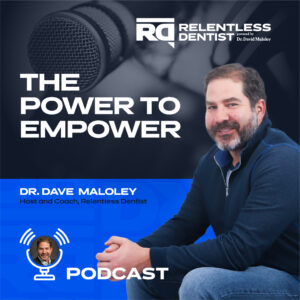
“An empowered organization is one in which individuals have the knowledge, skill, desire and opportunity to personally succeed in a way that leads to collective organizational success.” ― Stephen Covey, The 7 Habits of Highly Effective People
Pride in your work increases with freedom of choice. According to statistics, less than 1% of employees feel proud to tell others they work for an organization when the boss rarely gives them freedom of choice. However, 78% of employees feel proud to tell others about their work when the boss allows them the freedom to choose frequently.
Today’s episode will cover principles of empowerment — why most dentists want an empowered and engaged team but don’t feel confident in this quest. I’ll explain the big difference between holding your team accountable and fostering their accountability. Then, I will discuss how to make your team feel empowered and appreciate the great paradox of leadership. I will also share how Jolly Rancher and Stephen Covey’s books made a polarizing impact on my life and a personal experience on how efficiently an empowered team works during my visit with Dr. Andrew Turchin.
Tune in and find solutions to common practice issues at Prescriptions for Your Practice.
Key Quotes:
- “Too often in dentistry, we go looking for sophistication, bright shiny objects, and new and innovative wins.”
- “If you’re spending a ton of time holding your team accountable, your team will never even come close to reaching its full potential.”
- “You can only gain power by giving it away.”
- “The feeling of power or empowerment only comes from a sense of control.”
- “Personal accountability is the only true accountability.”
- “Encourage honest mistakes.”
- “The results are the only thing that pays the bill.”
- “Even if someone knows how to do their job, a lack of confidence or a fear of making mistakes will keep them from doing what needs to be done.”
- Take charge and lead the way.”
Featured on the Show:


by [email protected] | Nov 3, 2021 | Prescriptions for your Practice
Podcast: Play in new window | Download
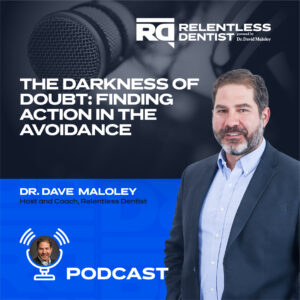 “Our doubts are traitors, and make us lose the good we oft might win, by fearing to attempt.” ― William Shakespeare, Measure for Measure
“Our doubts are traitors, and make us lose the good we oft might win, by fearing to attempt.” ― William Shakespeare, Measure for Measure
I’ll share with you my favorite story on overcoming self-doubt. This story involved my son Bennett when I felt that he was ready and decided to send him down the black run. He was scared, no doubt. But my confidence in him fueled his confidence, and after uttering a few “I can do it” mantras, he took off. We celebrated his victory over some hot chocolate, and he came up with another mantra that I use every time I need to boost my confidence. Listen in to find out.
In today’s episode, I’ll discuss how you can win the war on self-doubt. I will talk about how fear and hesitation can inhibit your progress, the 5 Cs that undermine your goals consistently, and the creative toolbox for avoiding avoidance so you can maintain professional momentum and build the practice of your dreams.
Tune in and find solutions to common practice issues at Prescriptions for Your Practice.
Key Quotes:
- “We avoid lots of things for lots of reasons, and in all of those reasons, we have embedded self-doubt.”
- “Self-doubt creates avoidance, and sometimes it sneaks upon us.”
- “Just like in dentistry, we need a diagnosis before we can create a treatment plan, and we need a treatment plan before we can create a treatment.”
- “If you grew up around people who avoided, people who were conflict avoiders, people who were worriers, then no doubt you take some of that on.”
- “Most people have a horror story at some point in time in their life. And what they do with that horror story that makes all the difference in their life.”
- “Usually, we’re trending towards the worst-case scenario that’s almost impossible to happen.”
- “In the Information Age, it’s easy to live in this delusion that I’m taking in tons of information; therefore, I must be productive.”
Featured on the Show:


by [email protected] | Oct 27, 2021 | Prescriptions for your Practice
Podcast: Play in new window | Download
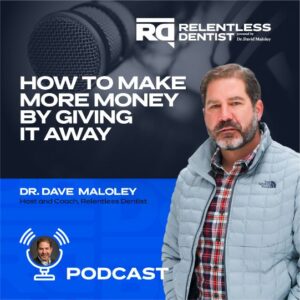 Statistically, 91% of consumers say they will switch to a brand that supports a good cause given similar price and quality.
Statistically, 91% of consumers say they will switch to a brand that supports a good cause given similar price and quality.
Back when I was still active with my dental practice in Vail, I created the “Monthly Give,” wherein we give a portion of the collection to our chosen nonprofit organization every month. We started in 2012 with a 1.2% allocation for charity and slowly ratcheted it up every year as our profit grew bigger and bigger. How can we be generous with giving as we grow?
In today’s episode, I’ll talk about cause marketing — how it works, how your organization can get involved, and how it can benefit your team, your organization, your patients, and the community you are serving. Then, I’ll share steps to successfully create a cause marketing drive and address the objections to spotlighting your philanthropy. Finally, an anecdote from one of our patients clearly shows how impactful generosity is as it creates a powerful domino effect.
Tune in and find solutions to common practice issues at Prescriptions for Your Practice.
Key Quotes:
- “There are more benefits in cause marketing than just writing checks and knowing that they will help people’s lives easier and better.”
- “In each monthly meeting, a time is dedicated to nominating the next nonprofit partner.”
- “There should be a priority system that needs to be built out.”
- “This is not giving back. Giving back assumes you took something. This is just generosity. This is just giving.”
- “The more you grow, the more you get to give.”
- “There’s no one that doesn’t benefit from a good cause marketing.”
Featured on the Show:


by [email protected] | Oct 20, 2021 | Prescriptions for your Practice
Podcast: Play in new window | Download
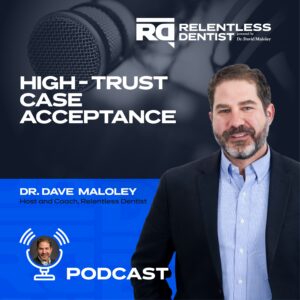 What are we doing to ensure that we’re not presenting treatment in a skeptical environment and inadvertently generating negative marketing for ourselves and our businesses?
What are we doing to ensure that we’re not presenting treatment in a skeptical environment and inadvertently generating negative marketing for ourselves and our businesses?
Research shows that 55% of all communication is in the body language, 38% is in the tone of voice, and 7% is in the actual words spoken — all of which make up the overall impression we give out to our patients.
The way your patients perceive your practice impacts every decision and action they take. This perception has a rippling effect on your confidence, staff, potential customers, and business security.
In today’s episode, I’ll share with you two contrasting personal stories on what enthusing client is and what it’s not. Then, I have some tips that you can train your team on to ensure you’re generating high-trust case acceptance in your practice. I’ll also talk about the importance of picking up non-verbal and social cues to reciprocate appropriate responses.
Tune in and find solutions to common practice issues at Prescriptions for Your Practice.
Key Quotes:
- “If we don’t do our practice in a trusting environment, it can generate buyer’s remorse and resentment if something goes wrong.”
- “Too often, we hang too much on what our patients are telling us, and sometimes they are not candid.”
- “We have to make sure that we’re picking up on the tone of voice and body language before we’re really satisfied that this person is scheduled for the next phase of treatment.”
- “If we don’t read their body language, we can inadvertently scare and confuse the patient.”
- “The possibility is that we appreciate that body language doesn’t lie.”
- “The goal that we must establish and the intent that we should have is that every patient all day long is seen, heard, and felt like we’ve let them know that they matter to us.”
- “You should look for a long-term relationship because it pays dividends again and again and again.”
- “Your team is your eyes, ears, and spokespeople, so they must be good as you are, if not better.”
Featured on the Show:


 Before you tap that play button, I want you to ponder these questions first: What do patients consider when they choose their dentist? And what makes them go and explore dental services from other dentists?
Before you tap that play button, I want you to ponder these questions first: What do patients consider when they choose their dentist? And what makes them go and explore dental services from other dentists?



 “Our doubts are traitors, and make us lose the good we oft might win, by fearing to attempt.”
“Our doubts are traitors, and make us lose the good we oft might win, by fearing to attempt.”  Statistically, 91% of consumers say they will switch to a brand that supports a good cause given similar price and quality.
Statistically, 91% of consumers say they will switch to a brand that supports a good cause given similar price and quality. What are we doing to ensure that we’re not presenting treatment in a skeptical environment and inadvertently generating negative marketing for ourselves and our businesses?
What are we doing to ensure that we’re not presenting treatment in a skeptical environment and inadvertently generating negative marketing for ourselves and our businesses?